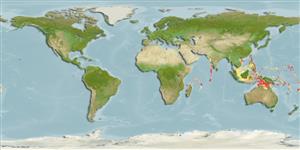>
Anguilliformes (Eels and morays) >
Chlopsidae (False morays)
Etymology: Boehlkenchelys: Because of Dr. James Böhlke + Greek, enchelys,-yos = eel (Ref. 45335); longidentata: Named for its long, needle-like teeth..
Environment: milieu / climate zone / depth range / distribution range
Ökologie
seewasser demersal; tiefenbereich 12 - 65 m (Ref. 58018). Tropical
Indo-West Pacific: Chagos. Islands, Indonesia, Fiji, and Palau.
Size / Gewicht / Alter
Maturity: Lm ? range ? - ? cm
Max length : 20.1 cm TL Männchen/unbestimmt; (Ref. 37816)
Kurzbeschreibung
Morphologie | Morphometrie
Rückenflossenweichstrahlen (insgesamt): 340-373; Afterflossenweichstrahlen: 253 - 294; Wirbelzahl: 121 - 128. Uniformly olive-brown in life. Body depth 27-31; HL 7.5 - 7.7 (Ref. 37816). Dorsal fin begins above or slightly anterior to the gill opening. Pectoral fin well-developed, rounded, almost twice eye diameter in length. Snout relatively deep. Gape moderate, rictus behind posterior margin of eye. Anterior nostril tubular, slightly behind tip of snout, directed anterolaterally. Posterior nostril a simple elliptical opening in front of middle of eye. Lateral line obsolete except for 2-3 pores in the branchial region (Ref. 40884).
Inhabits seaward reef slopes.
Life cycle and mating behavior
Geschlechtsreife | Fortpflanzung | Ablaichen | Eier | Fecundity | Larven
Tighe, K.A., 1992. Boehlkenchelys longidentata, a new genus and species of chlopsid eel (Teleostei: Anguilliformes) from the Indo-West Pacific Region. Proc. Biol. Soc. Wash. 105(1):19-22. (Ref. 40884)
IUCN Rote Liste Status (Ref. 130435)
Bedrohung für Menschen
Harmless
Nutzung durch Menschen
Mehr Information
NamenSynonymeMetabolismusRäuberÖkotoxikologieFortpflanzungGeschlechtsreifeAblaichenSpawning aggregationFecundityEierEientwicklung
Alter/GrößeWachstumLänge-GewichtLänge-LängeLängenhäufigkeitenMorphometrieMorphologieLarvenLarven Pop.Dyn.RekrutierungDichteBRUVS
ReferenzenAquakulturAquakultur ProfilZuchtlinienGenetikElectrophoresesVererbbarkeitKrankheitenVerarbeitungNutrientsMass conversion
PartnerBilderStamps, Coins Misc.LauteCiguateraGeschwindigkeitSchwimmstilKiemenoberflächeOtolithsGehirngrößeSehfähigkeit
Tools
Zusatzinformationen
Download XML
Internet Quellen
Estimates based on models
Preferred temperature (Ref.
123201): 26.5 - 28.9, mean 27.8 °C (based on 86 cells).
Phylogenetic diversity index (Ref.
82804): PD
50 = 1.0000 [Uniqueness, from 0.5 = low to 2.0 = high].
Bayesian length-weight: a=0.00102 (0.00046 - 0.00225), b=3.06 (2.88 - 3.24), in cm total length, based on all LWR estimates for this body shape (Ref.
93245).
Trophic level (Ref.
69278): 3.8 ±0.6 se; based on size and trophs of closest relatives
Fishing Vulnerability (Ref.
59153): Low vulnerability (10 of 100).
